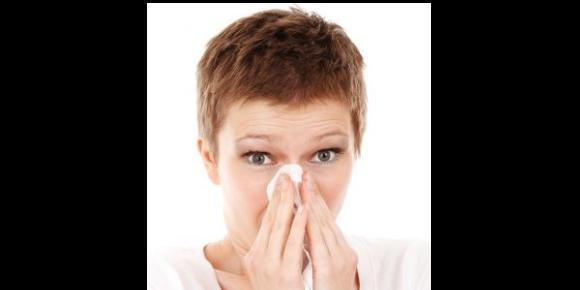Winter Allergies

- posted: Oct. 09, 2018
Can you have allergies in the winter? Absolutely.
You may be wondering why your eyes are still red and itchy, why your eyelids are swollen and why you’re still sneezing and congested since allergy season is supposed to be over now that winter is in full bloom. If you’re still having these symptoms, it may be a case of winter allergies.
When the summer and fall seasons end, anyone who is allergic to pollen gets a break since pollen production takes a halt during the cold season. Unfortunately, there’s no respite for those who are sensitive to indoor allergens like mold, dust mites and pet dander.
Winter allergy symptoms are similar to seasonal allergy symptoms. If you notice they seem to be worse in the winter, it’s because you’re more exposed to these allergens since you’re likely spending more time inside. With the furnace blowing more in the winter season, dust mites, mold and other particles blow into the air and get into your nose to cause allergic reactions.
Allergic eye reactions occur in an effort to protect your eyes from a perceived threat (in this case, winter allergens). Your eyes will release histamines, which can cause symptoms of redness, itchiness and tearing. The best way to reduce allergy discomfort and protect your eyes from an allergic reaction is to stay away from allergens as much as possible.
A few tips to diminish exposure and help symptoms include:
1. Reducing indoor allergens
Clean dust-filled surfaces with a damp mop, rag or paper towel instead of dry dusting or sweeping.
Regularly clean humid and damp areas that are subject to mold (bathrooms, basement, kitchen) with bleach. Also, use a dehumidifier when necessary.
Wash bedding (sheets, blankets, pillows) frequently in hot water.
Wash your hands and clothes if you come in contact with pets, dust or mold.
2. Avoiding contact lenses, or reducing wear time, when allergies flare up because symptoms can worsen. Having a pair of glasses for back up is key here.
3. Remembering to never rub your eyes. Eye rubbing can aggravate symptoms and make them worse, which can sometimes lead to an eye infection. Flushing your eyes with water and putting ice on them can reduce itchiness and swelling.
Contact us for more information about winter allergy tips or to schedule an eye appointment.
FYI: How can you tell whether your symptoms are from allergies or from a cold? A cold usually doesn’t last for more than 10 days, while allergies can linger for weeks or even months. Also, a cold generally has aches, pains and a fever associated with it, whereas those symptoms don’t usually occur with allergies.

- posted: Oct. 09, 2018
Can you have allergies in the winter? Absolutely.
You may be wondering why your eyes are still red and itchy, why your eyelids are swollen and why you’re still sneezing and congested since allergy season is supposed to be over now that winter is in full bloom. If you’re still having these symptoms, it may be a case of winter allergies.
When the summer and fall seasons end, anyone who is allergic to pollen gets a break since pollen production takes a halt during the cold season. Unfortunately, there’s no respite for those who are sensitive to indoor allergens like mold, dust mites and pet dander.
Winter allergy symptoms are similar to seasonal allergy symptoms. If you notice they seem to be worse in the winter, it’s because you’re more exposed to these allergens since you’re likely spending more time inside. With the furnace blowing more in the winter season, dust mites, mold and other particles blow into the air and get into your nose to cause allergic reactions.
Allergic eye reactions occur in an effort to protect your eyes from a perceived threat (in this case, winter allergens). Your eyes will release histamines, which can cause symptoms of redness, itchiness and tearing. The best way to reduce allergy discomfort and protect your eyes from an allergic reaction is to stay away from allergens as much as possible.
A few tips to diminish exposure and help symptoms include:
1. Reducing indoor allergens
Clean dust-filled surfaces with a damp mop, rag or paper towel instead of dry dusting or sweeping.
Regularly clean humid and damp areas that are subject to mold (bathrooms, basement, kitchen) with bleach. Also, use a dehumidifier when necessary.
Wash bedding (sheets, blankets, pillows) frequently in hot water.
Wash your hands and clothes if you come in contact with pets, dust or mold.
2. Avoiding contact lenses, or reducing wear time, when allergies flare up because symptoms can worsen. Having a pair of glasses for back up is key here.
3. Remembering to never rub your eyes. Eye rubbing can aggravate symptoms and make them worse, which can sometimes lead to an eye infection. Flushing your eyes with water and putting ice on them can reduce itchiness and swelling.
Contact us for more information about winter allergy tips or to schedule an eye appointment.
FYI: How can you tell whether your symptoms are from allergies or from a cold? A cold usually doesn’t last for more than 10 days, while allergies can linger for weeks or even months. Also, a cold generally has aches, pains and a fever associated with it, whereas those symptoms don’t usually occur with allergies.
